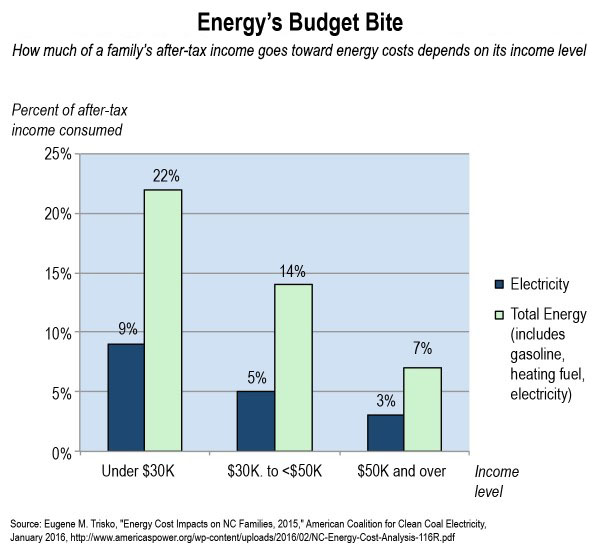My newsletter discusses the implications of a new poll of North Carolinians’ opinions about renewable energy. A snippet (with emphasis added):
But a closer reading of the poll results and information given and withheld from respondents supports the idea that what North Carolinians want is more choice in electricity provision and a stronger economy.
Use of these results to suggest that North Carolinians favor renewable energy mandates, such as the renewable energy portfolio standards (RPS), would be mistaken. …
In a roundabout way, RPS supporters have a few things working in their favor:
- Consumers dislike and distrust the electricity monopoly (see questions 3, 7, and 14) and want choice (questions 4, 15-18, and also 19-28).
- Consumers think electricity is increasingly too expensive (questions 2, 5, 6, and 15), but they tend to think utility greed is the main cause (question 7).
- Consumers are worried about the economy and want to see more job opportunities and employers in North Carolina (questions 2, 7, 8, 9, 13, and 14-18).
With select phrasing and juxtaposition, it can be made to appear as if North Carolinians favor the RPS mandate with its higher electricity prices and restrictions of consumer choices. All it takes is being very, very careful to avoid spilling the beans to respondents about the RPS mandate being a state directive and about the wide cost differences among the different electricity sources.
In other words, remove the lack of choice and the disparate costs from the narrative, and speak of renewable energy in terms of choice, market competition (which suggests lower costs), and job creation.
I found the choice-based approach to many poll questions very instructive, and respondents overwhelmingly welcomed the idea of choice and market competition in the electricity market here. For example (emphasis added):
- 89.5 percent agreed there should be “more options for providing and purchasing power and electricity from other companies in North Carolina, in order to ensure that rates are competitive and that energy providers are responsive to the needs of their customers and the general public.”
- 88.7 percent supported “new legislation that would allow other energy companies besides Duke Energy to also sell power and electricity services directly to consumers and businesses in North Carolina, to create more market competition.”
- 83.2 percent supported “new legislation that would create opportunities for alternative energy companies that use sustainable and renewable energy resources, such as the sun and wind, to offer power and electricity services directly to consumers and businesses in North Carolina.”
The poll found strong support for renewable energy. So did, by the way, a Civitas poll last year. Civitas found 70 percent of North Carolinians in support of using renewable sources to meet energy needs.
Civitas, however, then asked what the NCSEA poll avoided: if North Carolinians favor being forced to purchase renewable energy. Support fell to just 21 percent.


